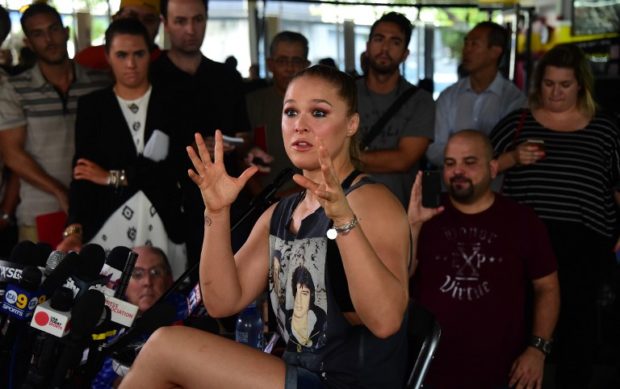
Mixed Martial Arts (MMA) fighter Ronda Rousey responds to questions during media Day in Glendale, California on October 27, 2015 ahead of her November 14 fight in Melbourne, Australia against Holly Holm. AFP PHOTO / FREDERIC J. BROWN / AFP PHOTO / FREDERIC J. BROWN
Sweat glistens on Brooke Carlucci’s brow as she drives home kicks and jabs. She and a dozen fellow Mixed Martial Arts students can crush anyone’s notion that extreme combat sports are a man’s thing.
Focused and with her body in combat position, the 20-year-old journalism student pounds the bag hanging in front of her: she’s here to learn how to defend herself, but also to keep fit, blow off steam and have fun.
“People think it’s just for boys, and it’s not. Girls can do it too,” she said at a gym in La Mirada, south of Los Angeles. “We can be strong, we can have fun and grow.”
“There is definitely the stereotype that it’s violent, bloody and gross. On TV it’s seen as bad, but girls can do it. And it doesn’t have to be violent,” she told AFP, exhausted but happy after a tough workout, rubbing the bandages that protect her hands.
Men ran the show for many years in the MMA world: a form of combat sport where anything goes — meaning a dizzying flurry of techniques and moves from judo, wrestling, boxing, kickboxing, karate and other martial arts. The point is to maximize physical contact.
Its popularity started growing in the United States in 1993 when the firm Ultimate Fighting Championship (UFC) turned it into a multi-million dollar moneymaker. It shows the fights on a pay cable channel that is seen by 800 million people around the world.
Enter Ronda
The beginning of the end of MMA as a boys’ club came eight years ago when Ronda Rousey, at the time an Olympic judo star who took a bronze medal in Beijing, found a new direction in the combat sport.
Now 29, she is the world’s most famous woman fighter. She is also the world’s eighth most highly paid sportsperson, with an annual income of around $6.5 million including $3.5 from advertising.
Rousey’s powerful presence in the ring, her intelligent handling of her fame, her shrewd businesswoman’s instincts, her wide appeal and her beauty all have helped turn her into one of the most influential figures in sports worldwide.
Strong, and proud of it
The “Ronda Rousey effect” has gone a long way in recent years toward sparking the surge in women around the country stopping into gyms to give MMA a go.
“She has unquestionably brought an influx of young girls and women into MMA,” said Josh Gross who has been covering the sport for years
“I don’t think there’s any question Rousey’s influence has made women look at MMA and see it as not so much a thing of violence or reckless behavior or brutality.”
Rousey is adamant about encouraging women not to shy away from MMA.
“They’ve never had the idea that it was possible to be there before. She’s almost a superhero to them,” Gross added.
Genevieve Soszynski can back that up.
She has been teaching MMA at different Los Angeles area gyms for a decade. And every day, she has more women students keen to hone combat skills and feel stronger.
“It’s great to see more women get comfortable with it and want to learn a new skill and be confident doing that,” she said.
“Some of them are a little intimidated by the contact. (But) that initial intimidation quickly melts away once they get in.”
Abrey Martin, one of her students, is dead serious about her own training and progress.
Each blow to the bag, each lightning kick highlights her determination. She is clearly rushing on adrenaline as she pounds away looking for perfect hits.
“I really wanted to do something that made me feel strong and not embarrassed to be strong.
“It can be passionate and fun, and something that gives you strength and growth and you can learn a lot from it. It’s not violent,” she said without catching a breath.
Just like Martin, Carlucci is fine with her body showing her progress, and fine with her trim lines taking on fearsome new curves.
“I think it’s cool that girls can have muscles and be really strong and not have that stereotype of ‘stick thin.’ It looks awesome,” she said. “You feel sexy.”